中考复习一般过去时详细讲解与练习题(附答案)
(英语)中考英语一般过去时真题汇编(含答案)及解析

(英语)中考英语一般过去时真题汇编(含答案)及解析一、初中英语一般过去时1.—I am sorry I _______ my exercise book at home.— Don't forget _______ it to school tomorrow.A. forget; to takeB. left; to bringC. forgot; to bringD. left; to take【答案】A【解析】【分析】forget忘记;leave留下;bring带来;take带走。
句意:抱歉,我把我的练习本忘在家里了。
——明天不要忘了把它带到学校来。
Forget后接动名词表示忘记做过的某事,接不定式是忘记去做某事,结合语境可知上文描述的是刚才发生的动作,故从句谓语动词用过去时态,下文表示不要忘记做某事,选A。
【点评】该题型是属于基础题型,是必考内容。
英语动词同汉语一样具有一词多义,一词多性的特点。
解答此类问题首先要理解每个单词的基本含义,并注意交叉含义间的区别,了解其特殊用法及习惯搭配等特点,然后结合语境选择正确答案。
英语宾语从句的时态和主句没有必然的联系,需结合语境进行具体分析。
2.— Where did you go last weekend?— I to the Great Wall.A. goB. wentC. will goD. have gone【答案】B【解析】【分析】句意:——上个周末你去哪里了?——我去长城了。
A,go一般现在时。
B,went一般过去时C,will go一般将来时。
D,have gone现在完成时。
据时间状语last weekend可知此处用一般过去时,故用动词的过去式went。
故选B。
【点评】本题考查一般过去时。
以及go、went、will go、have gone四种事态的用法和区别。
3.— Are you a basketball player in your school ?— Yes. I ______________ the team 3 years ago. I ______________ in it for 3 years.A. joined; wasB. was joined; amC. have joined; have beenD. joined; have been【答案】 D【解析】【分析】句意:——你是你们学校的篮球运动员吗?——是的,三年前我加入了这个团队,我在里面呆了3年。
(英语)中考英语一般过去时常见题型及答题技巧及练习题(含答案)

(英语)中考英语一般过去时常见题型及答题技巧及练习题(含答案)一、初中英语一般过去时1.He to play sports, but now he is interested in soccer and volleyball.A. doesn't useB. wasn't usedC. didn't useD. didn't used【答案】 C【解析】【分析】句意:他______做运动,但是现在他对足球和排球很感兴趣。
根据句意和选项可知此题考查一般过去时态的否定句式didn't+动词原形,故选C。
【点评】此题考查一般过去时态的否定句式,平时应多归纳总结各种时态,语态和句式的结构及用法。
2.—Linda hasn't come to the party yet.—But she . I think I have to call her again.A. promisesB. promisedC. will promise【答案】 B【解析】【分析】句意:——琳达还没来参加聚会。
——但她答应了。
我想我得再给她打个电话。
根据 I think I have to call her again. 我得再给她打个电话。
可知她答应了,应用一般过去时,故选B。
【点评】考查动词一般过去时的用法。
3.Everyone except Tom and John there when the meeting began.A. areB. isC. wereD. was 【答案】 D【解析】【分析】句意:当会议开始的时候,除了Tom和John没来,每个人都在这。
except和besides两者都是“除去”之意,但前者指“但并不包括”,是“排除”之意,后者指“除此之外还有”,是“外加”之意。
举例如下:There are six of us besides Tom.除汤姆外,另外还有6人。
(英语)英语一般过去时解题技巧分析及练习题(含答案)

(英语)英语一般过去时解题技巧分析及练习题(含答案)一、初中英语一般过去时1.The old man _________________ Bajin was a famous writer.A. was calledB. is calledC. calledD. calls【答案】 C【解析】【分析】句意:老人巴金是一位著名的作家。
谓语动词是was,故此处缺少非谓语动词,call与man是被动关系,故是过去分词用后置定语,故选C。
【点评】考查非谓语动词,注意过去分词的用法。
2.—Do you know who invented lights?—Yes, they by Edison.A. inventedB. are inventedC. were inventedD. was invented 【答案】 C【解析】【分析】句意:——你知道谁发明了电灯吗?——是的,它们是被爱迪生发明的。
A. invented发明,一般过去时态; B. are invented被邀请;一般现在时态的被动语态;C. were invented被邀请,一般过去时态的被动语态; D. was invented被邀请,一般过去时态的被动语态,单数。
电灯的发明已成为过去,这里是一般过去时态的被动语态,主语是复数,这里用were done的形式。
根据句意,故答案为C。
【点评】考查被动语态。
注意一般过去时态被动语态的构成。
3.--- When ______ you ______ here?--- Two days ago.A. did;comeB. have; comeC. will; comeD. do; come【答案】 A【解析】【分析】:本题考点为时态。
根据答语的明显时间标志词ago,可知本题所考时态为一般过去时。
故答案为A。
4.—Great changes have taken place in our hometown over the past years.—Yeah. Things ______different when we were young.A. have beenB. areC. will beD. were【答案】D【解析】【分析】句意:——在过去的几年里,我们家乡发生了巨大的变化。
超详细一般过去时的全面讲解【附练习与答案】
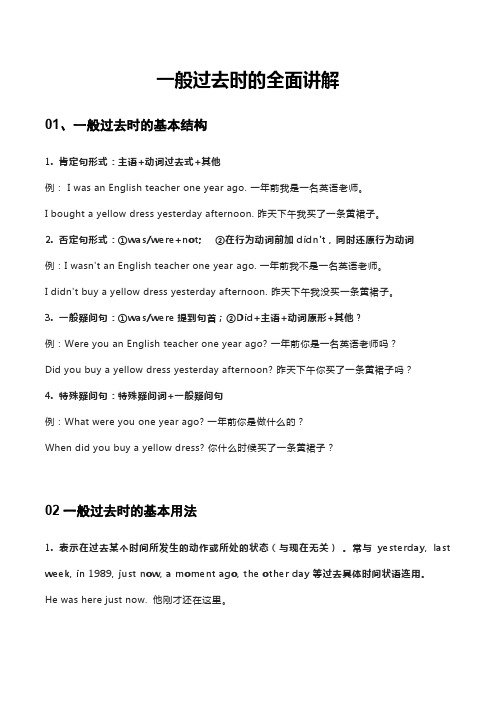
一般过去时的全面讲解01、一般过去时的基本结构1. 肯定句形式:主语+动词过去式+其他例: I was an English teacher one year ago. 一年前我是一名英语老师。
I bought a yellow dress yesterday afternoon. 昨天下午我买了一条黄裙子。
2. 否定句形式:①was/were+not; ②在行为动词前加didn't,同时还原行为动词例:I wasn't an English teacher one year ago. 一年前我不是一名英语老师。
I didn't buy a yellow dress yesterday afternoon. 昨天下午我没买一条黄裙子。
3. 一般疑问句:①was/were提到句首;②Did+主语+动词原形+其他?例:Were you an English teacher one year ago? 一年前你是一名英语老师吗?Did you buy a yellow dress yesterday afternoon? 昨天下午你买了一条黄裙子吗?4. 特殊疑问句:特殊疑问词+一般疑问句例:What were you one year ago? 一年前你是做什么的?When did you buy a yellow dress? 你什么时候买了一条黄裙子?02一般过去时的基本用法1. 表示在过去某个时间所发生的动作或所处的状态(与现在无关)。
常与yesterday, last week, in 1989, just now, a moment ago, the other day等过去具体时间状语连用。
He was here just now. 他刚才还在这里。
What did you do yesterday? 你昨天做了什么事?2. 在过去一段时间内的经常性或习惯性动作。
(英语)英语一般过去时及其解题技巧及练习题(含答案)及解析

(英语)英语一般过去时及其解题技巧及练习题(含答案)及解析一、初中英语一般过去时1.As we all know, the Silk Road _______ China to the west in ancient times.A. connectsB. connectedC. will connectD. is connecting【答案】B【解析】【分析】句意:众所周知,在古代丝绸之路是连接中国和西方的。
In ancient times“在古代”,因此要用一般过去式。
结合句意,故选B。
【点评】考查动词时态。
2.Everyone except Tom and John there when the meeting began.A. areB. isC. wereD. was【答案】 D【解析】【分析】句意:当会议开始的时候,除了Tom和John没来,每个人都在这。
except和besides两者都是“除去”之意,但前者指“但并不包括”,是“排除”之意,后者指“除此之外还有”,是“外加”之意。
举例如下:There are six of us besides Tom.除汤姆外,另外还有6人。
(一共7人)We all went home except Tom.除汤姆外,我们全回家了。
(只有汤姆一人未回家)。
谓语动词要看except前面的主语。
故选D。
【点评】本题考查be动词。
以及are、is、were、was四个词的用法和区别。
3.—Have you ever been to South Tower Park?—Yes. I ___________there a few months ago.A. wentB. have beenC. have gone【答案】A【解析】【分析】句意:—你曾经去过南塔公园吗?—是的,几个月前我去那儿了。
have been to曾经去过某地;have gone to去某地了;根据a few months ago.可知用一般过去时,动词用过去式,故选A。
(英语)中考英语一般过去时试题(有答案和解析)

(英语)中考英语一般过去时试题(有答案和解析)一、初中英语一般过去时1.Mr Zhang and his wife _______to the party last Sunday。
()A. invitedB. was invitedC. were invited【答案】 C【解析】【分析】句意:上周星期天请的张先生和妻子参加晚会。
表示上周星期天发生的过去动作,用一般过去时态;主语Mr Zhang and his wife是谓语动词invite的承受者,用被动语态,主语Mr Zhang and his wife表示复数合义。
故选C。
2.Everyone except Tom and John there when the meeting began.A. areB. isC. wereD. was【答案】 D【解析】【分析】句意:当会议开始的时候,除了Tom和John没来,每个人都在这。
except和besides两者都是“除去”之意,但前者指“但并不包括”,是“排除”之意,后者指“除此之外还有”,是“外加”之意。
举例如下:There are six of us besides Tom.除汤姆外,另外还有6人。
(一共7人)We all went home except Tom.除汤姆外,我们全回家了。
(只有汤姆一人未回家)。
谓语动词要看except前面的主语。
故选D。
【点评】本题考查be动词。
以及are、is、were、was四个词的用法和区别。
3.I was walking in the street when someone _______ me.A. calledB. was callingC. callsD. call【答案】 A【解析】【分析】句意:我正在街上走这时有人叫我。
状语从句中前后时态要保持一致,根据主句中的was walking可知此处用过去的时态,排除CD;此处call表示短暂性动作,所以不用进行时态,故答案为A。
【英语】英语一般过去时解题技巧(超强)及练习题(含答案)

【英语】英语一般过去时解题技巧(超强)及练习题(含答案)一、初中英语一般过去时1.—Have you ever been to Shanghai?—Of course. Actually, I _________there for six years but now I live in Taizhou.A. workedB. was workingC. would workD. have worked【答案】 A【解析】【分析】句意:——你去过上海吗?——当然。
事实上,我在那里工作了六年,但是现在我住在泰州。
根据答语 but now I live in Taizhou. 但是现在我住在泰州,可知在上海工作为过去发生的事情,时态应用一般过去时,work的过去式为worked,故选A。
【点评】考查一般过去时。
注意根据时间状语判断句子的时态,选择正确答案。
2.—Linda hasn't come to the party yet.—But she . I think I have to call her again.A. promisesB. promisedC. will promise【答案】 B【解析】【分析】句意:——琳达还没来参加聚会。
——但她答应了。
我想我得再给她打个电话。
根据 I think I have to call her again. 我得再给她打个电话。
可知她答应了,应用一般过去时,故选B。
【点评】考查动词一般过去时的用法。
3.The traffic was heavy this morning, but Dad________ to get to the office on time.A. managesB. managedC. would manageD. will manage【答案】 B【解析】【分析】句意:今天早上交通非常繁忙,但爸爸设法按时赶到了办公室。
根据The traffic was heavy this morning.可知,本句时态为一般过去时,动词“设法”manage的过去式为managed。
【英语】中考英语一般过去时题20套(带答案)及解析

【英语】中考英语一般过去时题20套(带答案)及解析一、初中英语一般过去时1.Bella, a young singer, ______ on January, 2015 because of cancer. Her death made us very sad.A. has been deadB. has diedC. was deadD. died【答案】 D【解析】【分析】句意:贝拉,一位年轻的歌手在2015年的1月因为癌症去世了。
她的死叫我们很难过。
根据时间on January, 2015可知用过去式,结合句意和语境应选D。
2.Everyone except Tom and John there when the meeting began.A. areB. isC. wereD. was【答案】 D【解析】【分析】句意:当会议开始的时候,除了Tom和John没来,每个人都在这。
except和besides两者都是“除去”之意,但前者指“但并不包括”,是“排除”之意,后者指“除此之外还有”,是“外加”之意。
举例如下:There are six of us besides Tom.除汤姆外,另外还有6人。
(一共7人)We all went home except Tom.除汤姆外,我们全回家了。
(只有汤姆一人未回家)。
谓语动词要看except前面的主语。
故选D。
【点评】本题考查be动词。
以及are、is、were、was四个词的用法和区别。
3.The traffic was heavy this morning, but Dad________ to get to the office on time.A. managesB. managedC. would manageD. will manage【答案】 B【解析】【分析】句意:今天早上交通非常繁忙,但爸爸设法按时赶到了办公室。
根据The traffic was heavy this morning.可知,本句时态为一般过去时,动词“设法”manage的过去式为managed。
中考英语时态全解之一般过去时(附中考真题点拨习题以及答案)

初中英语中考备考时态汇总讲解与辨析(附习题和答案)(本材料适合初中毕业年级使用,其他年级也可适当参考,也适合高中低年段时态掌握不好的学生使用。
本材料根据笔者教学经验、个人思考、历年中考原题和模拟题进行整理和改编,精选检测题并附点拨。
纯手工打造。
)一般过去时(四部分:一般过去时语法讲解,中考真题对接,一般过去时精选习题,中考真题演练)结构:动词或者系词变成过去式助词:did或系词was/were本身(常见的不规则动词变化:am (是) --was, is(是)--was, are(是)--were, begin(开始)--began, bring(拿来)--brought, can(能)--could, catch (捉住)--caught, come(来)--came, cut(砍,割)--cut, dig(挖,掘)--dug, do(做,干)--did, draw(画画,拉)--drew, drink(喝)--drank, drive(驾驶)--drove, eat(吃)--ate, fall(跌倒,落下)--fell, feel(感觉)--felt, fly(飞)--flew, get(获得)--got, give(给)---gave, go(去)--went, grow(生长)--grew, have (has)(有)--had, hurt(伤害)--hurt, keep(保持)--kept, know(知道,认识)--knew, learn(学习)--learnt, leave (离开)--left, let(让)--let, lie(躺,平放)--lay, make(使得,做)--made, may(可以)--might, must(必须)--must, read(读)--read, ride (骑)--rode, ring (鸣铃)--rang, run (跑)--ran, say (说)--said, see (看见)--saw, sell (卖)--sold, send(送)--sent, set (放)--set, sing(唱歌)--sang, sit (坐)--sat, sleep (睡觉)--slept, smell(闻)--smelt, speak(说话)--spoke, spend (花费)--spent, stand (站立)--stood, swim (游泳)--swam, take (拿到)--took, teach(教)--taught, tell (告诉)--told, think(认为)--thought, throw(投掷)--threw, understand(懂得)--understood, wake (唤醒)--woke, wear(穿)--wore, will(将要)--would, win(获胜)--won, write(写)--wrote)使用系词时,用系词本身构成否定疑问等:结构:⑴am 和is在一般过去时中变为was。
【英语】英语一般过去时的基本方法技巧及练习题及练习题(含答案)及解析

【英语】英语一般过去时的基本方法技巧及练习题及练习题(含答案)及解析一、初中英语一般过去时1.–The radio says there will be a heavy storm in Mount Emei tomorrow. –Bad luck. I _________ to go there with my classmates.A. planB. will planC. planned【答案】 C【解析】【分析】句意:一电台说,明天峨眉山有暴雨。
一真倒霉,我计划和同学们去那儿。
A. plan一般现在时态; B. will plan 一般将来时态;C. planned一般过去时态。
说话时,已有计划,表示过去发生的动作,用一般过去时态。
动词用过去式,故选C。
2.—Linda hasn't come to the party yet.—But she . I think I have to call her again.A. promisesB. promisedC. will promise【答案】 B【解析】【分析】句意:——琳达还没来参加聚会。
——但她答应了。
我想我得再给她打个电话。
根据 I think I have to call her again. 我得再给她打个电话。
可知她答应了,应用一般过去时,故选B。
【点评】考查动词一般过去时的用法。
3.—Have you ever been to South Tower Park?—Yes. I ___________there a few months ago.A. wentB. have beenC. have gone【答案】A【解析】【分析】句意:—你曾经去过南塔公园吗?—是的,几个月前我去那儿了。
have been to曾经去过某地;have gone to去某地了;根据a few months ago.可知用一般过去时,动词用过去式,故选A。
语法大全之一般过去时及专项练习题(答案)
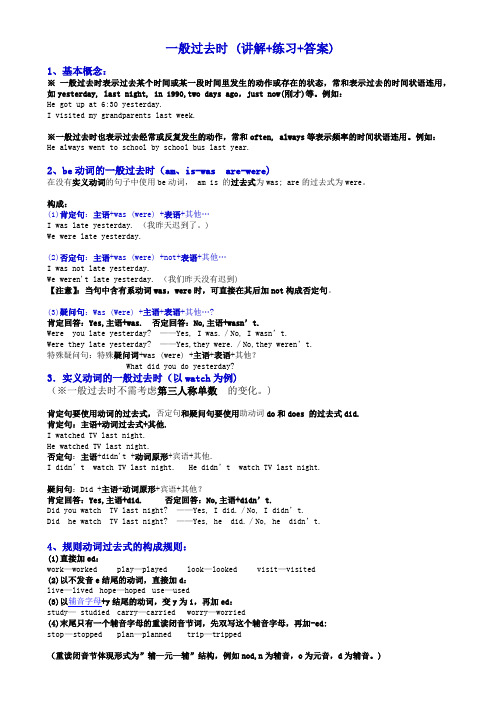
一般过去时 (讲解+练习+答案)1、基本概念:※ 一般过去时表示过去某个时间或某一段时间里发生的动作或存在的状态,常和表示过去的时间状语连用,如yesterday, last night, in 1990,two days ago,just now(刚才)等。
例如:He got up at 6:30 yesterday.I visited my grandparents last week.※一般过去时也表示过去经常或反复发生的动作,常和often, always等表示频率的时间状语连用。
例如:He always went to school by school bus last year.2、be动词的一般过去时(am、is-was are-were)在没有实义动词的句子中使用be动词, am is 的过去式为was; are的过去式为were。
构成:(1)肯定句:主语+was (were) +表语+其他…I was late yesterday. (我昨天迟到了。
)We were late yesterday.(2)否定句:主语+was (were) +not+表语+其他…I was not late yesterday.We weren't late yesterday. (我们昨天没有迟到)【注意】:当句中含有系动词was,were时,可直接在其后加not构成否定句。
(3)疑问句:Was (Were) +主语+表语+其他…?肯定回答:Yes,主语+was. 否定回答:No,主语+wasn’t.Were you late yesterday? ——Yes, I was./No, I wasn’t.Were they late yesterday? ——Yes,they were./No,they weren’t.特殊疑问句:特殊疑问词+was (were) +主语+表语+其他?What did you do yesterday?3.实义动词的一般过去时(以watch为例)(※一般过去时不需考虑第三人称单数的变化。
一般过去时详细讲解与练习题 1

一般过去时详细讲解与练习题(1)一般过去时用动词的过去式动词的过去式一般都加ed,如work---- worked.(2)结尾是e的只加d,如like--- liked.(3)末尾只有一个辅音字母的重读闭音节要双写这个字母再加ed, 如stop--- stopped,(4)以辅音字母加y结尾的,先变y为i再加ed,如study---- studied.另外还有一些不规则的变化,课本后边的单词表上有注释.温馨提示:重读闭音节的两个条件:1.口诀:看字母,倒转数,辅元辅。
(元音字母:a\e\i\o\u)2.看读音:结尾以辅音读音结尾的叫闭音节。
(结尾以元音读音结尾的叫开音节。
)is\am draw play are godrink work dance cry droppass does worry ask taste二.判断谓语动词一般过去时态的方法:1. 看过去时间-----定谓语动词时态2.看主语----定谓语动词的单复数和语态三、巧记一般过去时:动词一般过去时,表示过去发生的事;be 用was 或用were, have,has 变had ;谓语动词过去式,过去时间作标志;一般动词加-ed ,若是特殊得硬记否定句很简单,主语之后didn ’t 添; 疑问句也不难,did 放在主语前; 不含be 动词时如果谓语之前有did ,谓语动词需还原;动词若是was,were,否定就把not 添。
含be 动词时疑问句也不难,要把was ,were 放在主语前。
四.be 的一般过去时:学习动词be 的一般过去时,下面有一口诀,它可以帮你们更好地掌 握动词be 的一般过去时。
be 的过去时有四巧:一是时间状语巧, 表示过去的短语要记牢; 二是形式巧,单数was ,复数were ;三巧是否定句结构,not 紧跟was /were ; 四是疑问句式巧,was /were 向前跑(提前)。
【一巧】时间状语(即标志词)巧。
初中英语一般过去时讲解+练习(含答案)
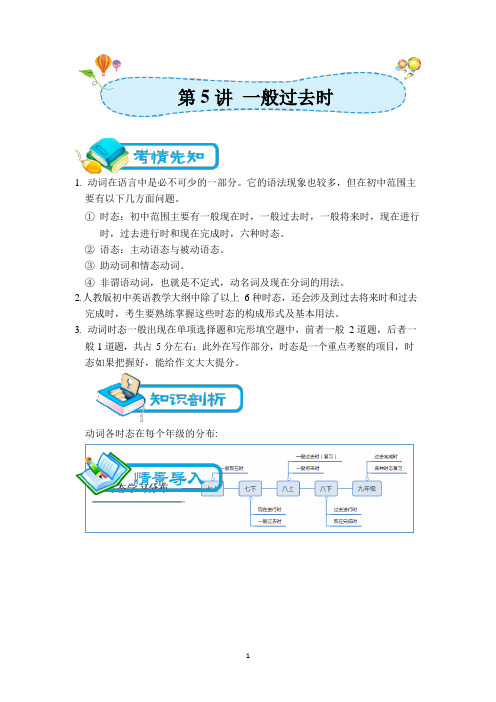
1. 动词在语言中是必不可少的一部分。
它的语法现象也较多,但在初中范围主要有以下几方面问题。
① 时态:初中范围主要有一般现在时,一般过去时,一般将来时,现在进行时,过去进行时和现在完成时,六种时态。
② 语态:主动语态与被动语态。
③ 助动词和情态动词。
④ 非谓语动词,也就是不定式,动名词及现在分词的用法。
2. 人教版初中英语教学大纲中除了以上 6 种时态,还会涉及到过去将来时和过去完成时,考生要熟练掌握这些时态的构成形式及基本用法。
3. 动词时态一般出现在单项选择题和完形填空题中,前者一般 2 道题,后者一般 1 道题,共占 5 分左右;此外在写作部分,时态是一个重点考察的项目,时态如果把握好,能给作文大大提分。
动词各时态在每个年级的分布:第 5 讲 一般过去时1.yesterday 或与其构成的短语:yesterday morning(afternoon, evening)等;2.由 last+时间名词构成的短语:last night, last year (winter, month, week)等;3.由―时间段+ago 构成的短语:a moment ago, a short time ago, an hour ago 等;4.其它 just now ,过去的时间:in 2000 等;一般过去时在七年级下册 Unit 11 中第一次出现,在这个单元的学习中,学生需要掌握以下知识点:一般过去时的定义及特征一般过去时的两种结构及其变化一般过去时的规则动词变形和不规则变形一般过去时的定义及特征定义:表示过去某个时间里发生的非持续性动作或存在的状态,也表示过去经常或反复发生的动作。
She opened the door this morning. (过去的非持续性动作) They were expensive twenty years ago. (过去存在的状态) I went swimming every Saturday last year. (过去经常发生的事)特征: a.谓语动词用过去式She was a doctor.I watered the flowers in the back yard. b.有表示过去的时间词She saw some paintings yesterday . Mary went fishing last weekend .注意:常与过去时搭配使用的标志性时间词1. 否定: 主语+was/were + not +其它 I was not (wasn’t) here yesterday.My parents were not (weren’t) at home last 2. 一般疑问句: Was/ Were +主语+其他?肯定回答用―Yes, 主语+was/were. 否定回答用―No, 主语+wasn’t/weren’t. ―Were you at home yesterday? ―Yes, I was. (No, I wasn’t.)—Were Wei Hua and Han Mei here just3. 特殊疑问句:特殊疑问词 + was/ were + 主语+其他?【即学即练】1. He usually gets up early in the morning. But he late today.2. She usually works from 8 a.m. to 5 p.m. But she from 8 a.m. to 6 p.m. yesterday.3. They often go to the park on Sundays. But they to the park last Monday.4. He reads the newspaper at breakfast. But he the newspaper yesterday morning.一般过去时的两种结构及其变化结构一:表示过去的状态: 主语+was/were +其它如:She was here yesterday.Three years ago I was a pupil. My parents were at home last night. 变化形式:否定:主语+did not +实义动词原形+其它 He didn’t watch TV yesterdayMike did not go to the farm last Sunday.一般疑问句: Did+ 主语+实义动词原形+其它? Did he watch TV yesterday?Did Mike go to the farm last Sunday?3.特殊疑问句:特殊疑问词 + did+ 主语 +实义动词原形+其它?What did he do yesterday?Where did Mike go last Sunday?结构二:表示过去发生的动作: 主语+实义动词过去式+其它注意:实义动词过去式分为规则和不规则变化(知识点三、四将会做详细讲解)如:He watched TV yesterday.Mike went to the farm last Sunday. Tom came to China last month. 变化形式:【即学即练】 1. My father ill yesterday. ( 2017 长沙七年级期末) A. isn’t B. aren’t C. wasn’tD. weren’t 2. your parents at home last week? ( 2017 江西七年级月考)A. isB. wasC. areD. were3. The twins in Dalian last year. They here now. ( 2016 大连七年级期末) A. are; wereB. were; areC. was; areD. were; was4. I my homework at 7:00 yesterday evening. ( 2017 兰州七年级期末)A. finishedB. would finishC. was finishingD. finish5. —?— He did some reading at home. ( 2017 安徽中考) A. What does your father do yesterday evening? B. What does your brother do in the school? C. What did your brother do over the weekend? D. Where did your brother go last Sunday?一般过去时的规则动词规则变形及不规则变形规则变形:情况加法原形例词一般情况加-ed look looked 以e 收尾的词加-d use used末尾只有一个辅音字母的重读闭音节词先双写这个辅音字母,再加-edstopplanstoppedplanned以“辅音字母+y”结尾的动词先变y 为i,再加-ed worrystudyworriedstudied不规则变形:1.中间去e 末尾加t,如:keep →kept,feel →felt,sleep →slept,sweep →swept2.结尾d 变t,如:build →built,lend →lent,send →sent,spend →spent3.遇见i 改为a,如:ring →rang,sit →sat,drink →drank,sing →sang,swim→ swam,4.“骑(马)”“开(车)”“写(字)”把i 变o 如:ride →rode,drive →drove,write →wrote 5.“想”“买”“带来”“打仗”ought 换上,如:think →thought,buy →bought,bring →brought,fight →fought6.“教书”“抓住”——aught 切莫忘,如:teach →taught,carry →caught7.ow/aw 改为ew 是新时尚,如:know →knew,grow →grew,throw →threw,draw →drew 8.“放”“让”“读”过去式与原形一个样,如:put → put,let → let,read → read /red/【即学即练】Dear Jim,My school trip 1. (is) great! We 2. (have) so much fun! We 3.(go) to Green Park. We 4. (climb) the mountains there and 5.(see) a lot of flowers. We 6. (eat) lunch under some trees and 7.(play) some games after that. But at about two o’clock, it 8. (get) very cloudy and we 9. _ (worry) it would rain. Luckily, it 10. (do not),and the sun 11. (come) out again!Bill易错点一:难以判别是否用过去式,如:I went to the supermarket and bought (buy) some fruit.由于没有找到时间状语,因而不知道应该填什么。
英语一般过去时解题技巧讲解及练习题(含答案)及解析
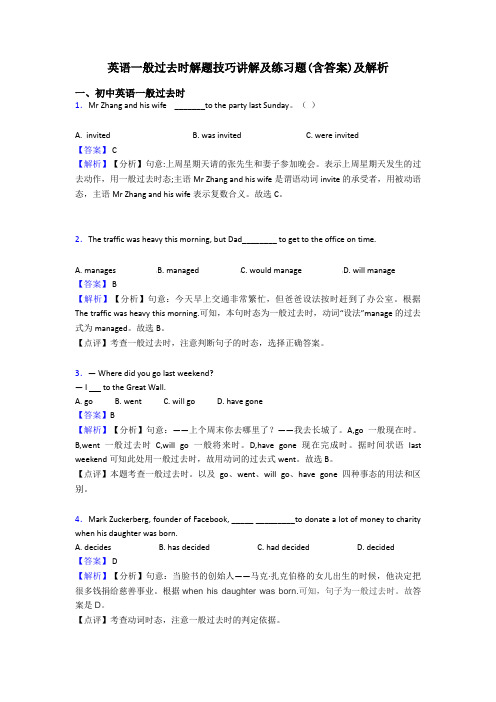
英语一般过去时解题技巧讲解及练习题(含答案)及解析一、初中英语一般过去时1.Mr Zhang and his wife _______to the party last Sunday。
()A. invitedB. was invitedC. were invited【答案】 C【解析】【分析】句意:上周星期天请的张先生和妻子参加晚会。
表示上周星期天发生的过去动作,用一般过去时态;主语Mr Zhang and his wife是谓语动词invite的承受者,用被动语态,主语Mr Zhang and his wife表示复数合义。
故选C。
2.The traffic was heavy this morning, but Dad________ to get to the office on time.A. managesB. managedC. would manageD. will manage【答案】 B【解析】【分析】句意:今天早上交通非常繁忙,但爸爸设法按时赶到了办公室。
根据The traffic was heavy this morning.可知,本句时态为一般过去时,动词“设法”manage的过去式为managed。
故选B。
【点评】考查一般过去时,注意判断句子的时态,选择正确答案。
3.— Where did you go last weekend?— I to the Great Wall.A. goB. wentC. will goD. have gone【答案】B【解析】【分析】句意:——上个周末你去哪里了?——我去长城了。
A,go一般现在时。
B,went一般过去时C,will go一般将来时。
D,have gone现在完成时。
据时间状语last weekend可知此处用一般过去时,故用动词的过去式went。
故选B。
【点评】本题考查一般过去时。
以及go、went、will go、have gone四种事态的用法和区别。
(英语)中考英语一般过去时练习题及答案含解析

(英语)中考英语一般过去时练习题及答案含解析一、初中英语一般过去时1.–The radio says there will be a heavy storm in Mount Emei tomorrow. –Bad luck. I _________ to go there with my classmates.A. planB. will planC. planned【答案】 C【解析】【分析】句意:一电台说,明天峨眉山有暴雨。
一真倒霉,我计划和同学们去那儿。
A. plan一般现在时态; B. will plan 一般将来时态;C. planned一般过去时态。
说话时,已有计划,表示过去发生的动作,用一般过去时态。
动词用过去式,故选C。
2.— Where did you go last weekend?— I to the Great Wall.A. goB. wentC. will goD. have gone【答案】B【解析】【分析】句意:——上个周末你去哪里了?——我去长城了。
A,go一般现在时。
B,went一般过去时C,will go一般将来时。
D,have gone现在完成时。
据时间状语last weekend可知此处用一般过去时,故用动词的过去式went。
故选B。
【点评】本题考查一般过去时。
以及go、went、will go、have gone四种事态的用法和区别。
3.—Have you ever been to South Tower Park?—Yes. I ___________there a few months ago.A. wentB. have beenC. have gone【答案】A【解析】【分析】句意:—你曾经去过南塔公园吗?—是的,几个月前我去那儿了。
have been to曾经去过某地;have gone to去某地了;根据a few months ago.可知用一般过去时,动词用过去式,故选A。
英语一般过去时解题技巧分析及练习题(含答案)含解析
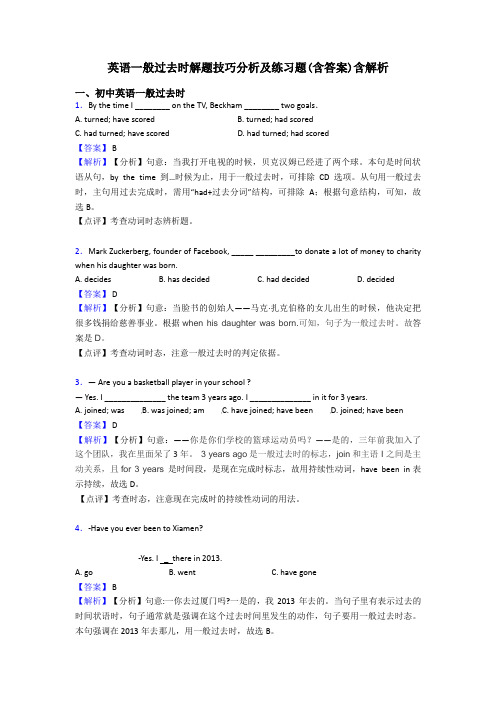
英语一般过去时解题技巧分析及练习题(含答案)含解析一、初中英语一般过去时1.By the time I ________ on the TV, Beckham ________ two goals.A. turned; have scoredB. turned; had scoredC. had turned; have scoredD. had turned; had scored【答案】 B【解析】【分析】句意:当我打开电视的时候,贝克汉姆已经进了两个球。
本句是时间状语从句,by the time到…时候为止,用于一般过去时,可排除CD选项。
从句用一般过去时,主句用过去完成时,需用“had+过去分词”结构,可排除A;根据句意结构,可知,故选B。
【点评】考查动词时态辨析题。
2.Mark Zuckerberg, founder of Facebook, _____ _________to donate a lot of money to charity when his daughter was born.A. decidesB. has decidedC. had decidedD. decided【答案】 D【解析】【分析】句意:当脸书的创始人——马克·扎克伯格的女儿出生的时候,他决定把很多钱捐给慈善事业。
根据when his daughter was born.可知,句子为一般过去时。
故答案是D。
【点评】考查动词时态,注意一般过去时的判定依据。
3.— Are you a basketball player in your school ?— Yes. I ______________ the team 3 years ago. I ______________ in it for 3 years.A. joined; wasB. was joined; amC. have joined; have beenD. joined; have been【答案】 D【解析】【分析】句意:——你是你们学校的篮球运动员吗?——是的,三年前我加入了这个团队,我在里面呆了3年。
中考英语一般过去时专题(含答案)

外研版英语中考英语一般过去时专题(含答案)一、初中英语一般过去时1.He almost fell down. But he _____.A. didn'tB. doesn'tC. won't【答案】 A【解析】【分析】句意:他几乎摔倒,但是他没有。
前句动词fell是fall的过去式,说明句子用的一般过去时态,后句也还是对那件事的描述,还是用一般过去时态,否定:动词前面加didn't,同时把动词变为原形。
故选A。
2.In February, Chinese tech company Huawei ________ Mate X, a foldable (可折叠的) 5G mobile phone.A. is introducingB. introducedC. introducesD. was introduced【答案】 B【解析】【分析】句意:二月,中国科技公司华为介绍Mate X,一款可折叠5G手机。
根据In February,可知陈述过去的事情,用一般过去时,谓语动词用过去式,introduce介绍,其过去式是introduced,故选B。
【点评】考查动词的时态,注意句子涉及一般过去时。
3.Everyone except Tom and John there when the meeting began.A. areB. isC. wereD. was【答案】 D【解析】【分析】句意:当会议开始的时候,除了Tom和John没来,每个人都在这。
except和besides两者都是“除去”之意,但前者指“但并不包括”,是“排除”之意,后者指“除此之外还有”,是“外加”之意。
举例如下:There are six of us besides Tom.除汤姆外,另外还有6人。
(一共7人)We all went home except Tom.除汤姆外,我们全回家了。
(只有汤姆一人未回家)。
(英语)英语一般过去时试题(有答案和解析)含解析
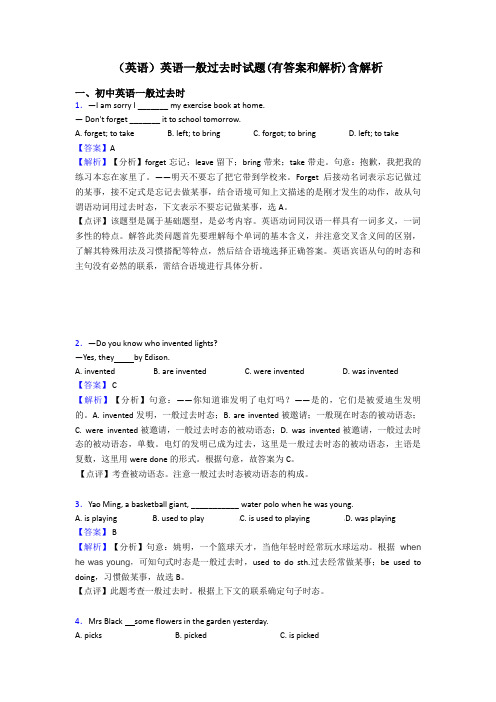
(英语)英语一般过去时试题(有答案和解析)含解析一、初中英语一般过去时1.—I am sorry I _______ my exercise book at home.— Don't forget _______ it to school tomorrow.A. forget; to takeB. left; to bringC. forgot; to bringD. left; to take【答案】A【解析】【分析】forget忘记;leave留下;bring带来;take带走。
句意:抱歉,我把我的练习本忘在家里了。
——明天不要忘了把它带到学校来。
Forget后接动名词表示忘记做过的某事,接不定式是忘记去做某事,结合语境可知上文描述的是刚才发生的动作,故从句谓语动词用过去时态,下文表示不要忘记做某事,选A。
【点评】该题型是属于基础题型,是必考内容。
英语动词同汉语一样具有一词多义,一词多性的特点。
解答此类问题首先要理解每个单词的基本含义,并注意交叉含义间的区别,了解其特殊用法及习惯搭配等特点,然后结合语境选择正确答案。
英语宾语从句的时态和主句没有必然的联系,需结合语境进行具体分析。
2.—Do you know who invented lights?—Yes, they by Edison.A. inventedB. are inventedC. were inventedD. was invented【答案】 C【解析】【分析】句意:——你知道谁发明了电灯吗?——是的,它们是被爱迪生发明的。
A. invented发明,一般过去时态;B. are invented被邀请;一般现在时态的被动语态;C. were invented被邀请,一般过去时态的被动语态;D. was invented被邀请,一般过去时态的被动语态,单数。
电灯的发明已成为过去,这里是一般过去时态的被动语态,主语是复数,这里用were done的形式。
高中必备英语一般过去时技巧全解及练习题(含答案)含解析
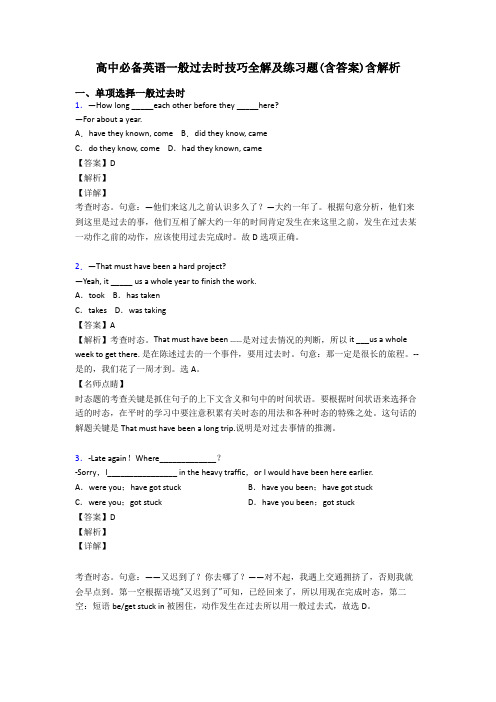
高中必备英语一般过去时技巧全解及练习题(含答案)含解析一、单项选择一般过去时1.—How long _____each other before they _____here?—For about a year.A.have they known, come B.did they know, cameC.do they know, come D.had they known, came【答案】D【解析】【详解】考查时态。
句意:—他们来这儿之前认识多久了?—大约一年了。
根据句意分析,他们来到这里是过去的事,他们互相了解大约一年的时间肯定发生在来这里之前,发生在过去某一动作之前的动作,应该使用过去完成时。
故D选项正确。
2.—That must have been a hard project?—Yeah, it _____ us a whole year to finish the work.A.took B.has takenC.takes D.was taking【答案】A【解析】考查时态。
That must have been ……是对过去情况的判断,所以 it ___us a whole week to get there. 是在陈述过去的一个事件,要用过去时。
句意:那一定是很长的旅程。
--是的,我们花了一周才到。
选A。
【名师点睛】时态题的考查关键是抓住句子的上下文含义和句中的时间状语。
要根据时间状语来选择合适的时态,在平时的学习中要注意积累有关时态的用法和各种时态的特殊之处。
这句话的解题关键是That must have been a long trip.说明是对过去事情的推测。
3.-Late again!Where_____________?-Sorry,I________________ in the heavy traffic,or I would have been here earlier.A.were you;have got stuck B.have you been;have got stuckC.were you;got stuck D.have you been;got stuck【答案】D【解析】【详解】考查时态。
(英语)必备英语一般过去时技巧全解及练习题(含答案)及解析

(英语)必备英语一般过去时技巧全解及练习题(含答案)及解析一、初中英语一般过去时1.They don't live here any longer. They _______ to Chengdu last month.A. moveB. movedC. will moveD. are moving【答案】B【解析】【分析】句意:他们不再住在这里了。
他们上个月搬到成都了。
last month是一般过去时的时间状语,动词用过去式,故答案选B。
【点评】考查一般过去时态。
2.—My car ________ yesterday. Could you please give me a ride tomorrow?—I'm sorry I can't, I'm ________ Dalian tomorrow morning.A. breaks down; flying atB. has broken down; flying atC. broke down; flying toD. had broken down; flying to【答案】 C【解析】【分析】句意:——我的车坏了,你明天能搭我一程吗?——对不起我不能,我明天早上要坐飞机去大连。
break down,出毛病,出故障,根据yesterday,可知用一般过去时,break的过去式是broke,根据tomorrow morning,可知用一般将来时,一些表示移动的动词可以用be+doing,表将来时,故选C。
【点评】考查动词的时态。
注意根据时间状语确定动词时态。
3.—Have you ever been to South Tower Park?—Yes. I ___________there a few months ago.A. wentB. have beenC. have gone【答案】A【解析】【分析】句意:—你曾经去过南塔公园吗?—是的,几个月前我去那儿了。
- 1、下载文档前请自行甄别文档内容的完整性,平台不提供额外的编辑、内容补充、找答案等附加服务。
- 2、"仅部分预览"的文档,不可在线预览部分如存在完整性等问题,可反馈申请退款(可完整预览的文档不适用该条件!)。
- 3、如文档侵犯您的权益,请联系客服反馈,我们会尽快为您处理(人工客服工作时间:9:00-18:30)。
2012年中考复习一般过去时详细讲解与练习题(附答案)一、巧记一般过去时:动词一般过去时,表示过去发生的事;be 用was 或用were, have,has 变had ;谓语动词过去式,过去时间作标志;一般动词加-ed ,若是特殊得硬记。
否定句很简单,主语之后didn’t 添;疑问句也不难,did 放在主语前; 不含be 动词时如果谓语之前有did ,谓语动词需还原;动词若是was,were,否定就把not 添。
含be 动词时疑问句也不难,要把was ,were 放在主语前。
二、be 的一般过去时:学习动词be 的一般过去时,下面有一口诀,它可以帮你们更好地掌握动词be 的一般过去时。
be 的过去时有四巧: 一是时间状语巧, 表示过去的短语要记牢; 二是形式巧,单数was ,复数were ; 三巧是否定句结构,not 紧跟was /were ; 四是疑问句式巧,was /were 向前跑(提前)。
一巧】时间状语(即标志词)巧。
一般过去时表示过去发生的动作或存在的状态,恰巧与表示过去的一些时间状语连用。
二巧】形式巧。
它与一般现在时一样,形式多样:当主语是第一人称单数或第三人称单数时,谓语动词用was ;主语是第二人称或其他人称复数时,动词用were 。
例如:They were over there a moment ago . 刚才他们在那边。
I was in the classroom yesterday morning . 昨早上我在教室。
He was at school last Tuesday . 上周二他在学校。
【三巧】否定句结构巧。
与动词be 的一般现在时一样,它在动词后面加not 即可变成否定句,并且was, were 与not 可以缩写成wasn't, weren't 。
即: 主语 + wasn't / weren't + 表语 + 其他。
例如:I was not (=wasn't) here yesterday . 昨天我不在这儿。
My parents were not (=weren't) at home last Sunday . 上周日我父母不在家。
【四巧】 疑问句式巧。
把was, were 提到句首,句末用问号即可变为一般疑问句。
即:Was(Were) + 主语 +表语 + 其他?这恰巧与动词be 的一般现在时的疑问句式相似。
例如:Were you at home the day before yesterday ﹖ 前天你在家吗?Was she late this morning ﹖今天早上她迟到了吗? 更巧的是疑问句的答语也相似,肯定回答用“Yes, 主语+was /were .”; 否定回答用“No,主语+wasn't /weren't .”。
例如:—Were Wei Hua and Han Mei here just now ﹖ 刚才魏华和韩梅在这儿吗?—Yes, they were . (No, they weren't .) 是的,她们在。
(不,她们不在。
)一、单项选择: 从下列各题后所给的四个选项中选择最佳答案填空。
(10)( )1. My father ______ill yesterday .A . isn't B . aren't C . wasn't D . weren't( )2. ______your parents at home last week ﹖ A . Is B . Was C . Are D . Were( )3. The twins ______in Dalian last year . They ______here now .A . are; wereB . were; areC . was; areD . were; was( )4. ______your father at work the day _____yesterday(前天)﹖A . Was; beforeB . Is; beforeC . Was; afterD . Is; after( )5. —Who was on duty last Friday ﹖ —______.A . I am B . I was C . Yes, I was D . No, I wasn't( )6. I cleaned my classroom ___________. A with three hours B three hours agoC in three hoursD three hours before( ) 7. I came _______ my house two days ago .A back on B back to C to back D back( ) 8 . ___________? He did some reading at home.A What does your father do yesterday eveningB What does your brother do in the schoolC What did your brother do over the weekendD Where did your brother go last Sunday( ) 9. What did you do ________ ? I went to the movies.A next morning Bover the weekend C in the weekend D next Monday( ) 10. The koala sleeps _______,but gets up _________.A during the day; at the eveningB at day ;during nightC in the day ;during the eveningD during the day ; at night1. yesterday 或以其构成的短语:yesterday morning(afternoon, evening)等;2. 由“last+一时间名词”构成的短语:last night, last year (winter, month, week)等;3. 由“时间段+ago ”构成的短语:a moment ago, a short time ago, an hour ago 等;4. 其它:just now 等5. 由某些表示过去时态的从句等。
二、1. I _________ (have) an exciting party last weekend. 请用正确动词形式填空。
(10)2. _________ she _________(practice) her guitar yesterday? No, she _________.3. What ________ Tom ________ (do) on Saturday evening?He ________(watch) TV and __________(read) an interesting book.4. They all _________(go) to the mountains yesterday morning.5. She _________(not visit) her aunt last weekend.She ________ (stay) at home and _________(do) some cleaning.6. When ________ you _________(write) this song? I __________(write) it last year.7. My friend, Carol, ________(study) for the math test and ________(practice) English last night.8. ________ Mr. Li __________(do) the project on Monday morning? Yes, he _________.9. How _________(be) Jim's weekend? It _________(be not) bad.10. ________ (be) your mother a sales assistant last year? No. she __________.三、翻译下列句子(20)1. 我过了一个忙碌但却刺激的周末。
I _______ ______ ________ _________ exciting weekend.2. Jenny喜欢看书。
昨晚她看了一本英语书。
Jenny likes _________ __________. She _________ an English book last night.3. Emma每天都看电视。
可是昨天他没有看。
Emma__________ TV every day. But he _________ ________ ________ yesterday.4. 上周六他们做什么了?他们做作业和购物了。
What ________ they _________ _________ Saturday?They _________ __________ homework and _________ __________.5. 今天早上方方得做饭,因为他父亲不在家。
This morning Fangfang ____ ____ ____ ____ because his father _____ _____ ____ yesterday.6. 你还有什么要说的?What _______ would you like _______ _______?7. 放学别忘了向老师说声再见。
Don’t forget ______ _______ _______ _______ the teacher.8. 为什么你昨晚没有看电视?Why _______ you _______ TV last night?9. 他在打扫教室的时候,发现地上有块表。
When he ______ the classroom, he ______ a watch on the ground.10. 他什么时候出生的?1980年。
